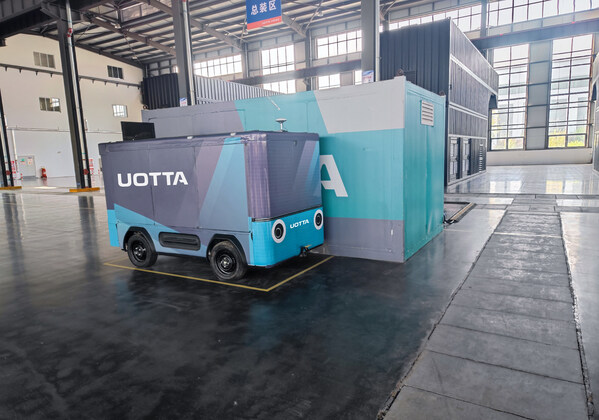SHANGHAI, Dec. 11, 2024 /PRNewswire/ — U Power Limited (the “Company” or “U Power”), a comprehensive EV battery power solution provider in China, announced today that the AI technology-based autonomous unmanned battery swapping logistics vehicle has been launched and has undergone road testing. This advancement represents a key milestone in U Power’s comprehensive electrification strategy for sustainable logistics operations, achieving full coverage of autonomous battery swapping and self-driving capabilities across long-haul, regional, and last-mile delivery scenarios.
Jia Li, Founder and CEO of U Power noted that to meet the rapidly growing global demand for last-mile logistics delivery, delivery vehicles often need to operate continuously for 24 hours under high-intensity conditions. This creates significant demand for fully autonomous driving and energy replenishment capabilities in electric logistics vehicles. The integration of autonomous driving technology with UOTTA’s automated battery swapping system presents an optimal solution for achieving fully automated, unmanned operations.
Currently available autonomous logistics vehicles in the market rely on manual plug-in charging for energy replenishment, making it impossible to achieve truly unmanned operations. However, based on UOTTA’s battery swapping technology and through deep integration with AI technology, the system has achieved self-adaptive autonomous battery swap station matching in terms of perception, decision-making, and control mechanisms. “This has enabled the complete automation and unmanning of electric vehicle battery swap stations, ultimately achieving unmanned energy replenishment for autonomous vehicles, creating the world’s first fully autonomous new energy vehicle operating solution.
Discussing the technical value of this product, Li Jia explained that U Power’s autonomous battery-swapping logistics vehicle employs an AI algorithm system based on Convolutional Neural Network (CNN) architecture to process multi-sensor data streams. This generates real-time path planning and decision-making, enhancing the vehicle’s emergency response capabilities in unexpected road situations. Additionally, the product’s data interface and cloud platform can integrate with various logistics enterprises and park systems, significantly improving transportation efficiency.
Regarding market potential, Li Jia indicated that autonomous logistics vehicles with self-operating battery swap capability are primarily targeted at various logistics parks and industrial parks. With the development needs of industrial internet and lighthouse factories under the low-carbon economy, automated green logistics systems centered on autonomous vehicles have become an irreplaceable transportation mode for these facilities. This technological innovation will reduce overall green logistics operating costs by over 46%, presenting a massive market opportunity worth hundreds of billions of dollars globally.
“We have already initiated contact with prominent logistics companies in multiple markets, including Hong Kong, Thailand, Mexico, Peru, and Portugal, to jointly promote the comprehensive application of autonomous logistics vehicles with self-operating battery swap capability and supporting solutions. Through continuous technological innovation and market expansion, we will meet the green logistics transportation needs of various industry clients, providing robust momentum for low-carbon sustainable development,” Li Jia added.

















